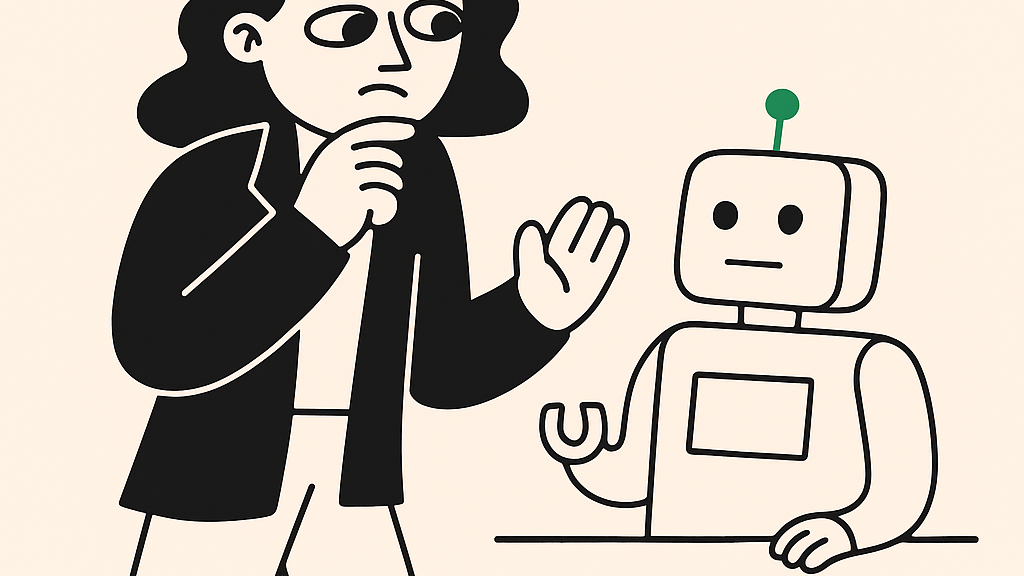
The Hiring Reset: Real talk: Where AI helps (and hurts) in hiring
This week: What good AI actually looks like in hiring, why platforms are cracking down, and a summer-proof lens for evaluating candidate fit.
Håkon
2025-07-08
As summer kicks off across Scandinavia, many hiring teams are slowing down, but the market? Still full tilt. The AI wave in recruiting hasn’t paused, and the gap between tools that help and tools that hype is growing fast.
I’m Håkon, founder of Vouch – your AI-native hiring assistant.The Hiring Reset is a weekly note on how modern hiring is changing, with clear signals and practical models to help you keep your edge, even during slower weeks.
Let’s dive in.
🧠 The case for careful AI
Hiring has always been about decisions under pressure. That’s exactly why AI can help, but only if it’s built for how people actually work, not how tech demos look.
Lately, we’ve seen a wave of tools, even established players, that promise “AI-powered” efficiency but deliver confusion. You get a 71% match score, but no idea what it means. Applicants are ranked by keyword density. Fit is inferred from formatting. It’s speed without substance.
One large company described their current screening process (without AI) to us bluntly: “Complete mayhem. The hiring manager never has time to review 200 applicants. If a good one shows up early, they hire them and auto-reject the rest.”
That’s honest, and typical. But it exposes the deeper issue: when screening becomes a race against time, fairness and quality suffer.
Bad AI can make this worse. Good AI can fix it.
Imagine 180 applicants for a technical role. You know what kind of background you need, but lack capacity for a deep review. A good AI assistant should:
- Extract relevant experience and qualifications
- Flag unclear areas and suggest clarification questions
- Show you why someone might be a match, and what to check next
It’s not about replacing your judgment, but rather about focusing it.
So how do we design AI that actually helps? We’ve found three principles worth sticking to:
Human in the loop: AI structures data, surfaces insight, conducts some autonomous or agentic work and suggests questions. You stay in control.
Built for hiring, not hype: Tools should match real workflows, not tech demos.
Explain everything: If a candidate’s ranked highly, you should know why.
Done right, AI can increase fairness, speed, and clarity. Not by taking over decisions, but by making them easier to own. Especially for lean teams that need to move fast and stay thoughtful. That’s the future we should build for.
🔍 Signal of the week
👔 CEOs warn of white-collar job losses: Ford’s CEO, Jim Farley, and leaders at Amazon, JPMorgan, Anthropic, Fiverr, and Shopify are now openly stating AI may eliminate half of U.S. white-collar jobs. Many are implementing hiring freezes unless roles are clearly human-essential. Read the WXJ story →
🤖 AI recruiters are talking to candidates, virtually: AI-driven virtual recruiters are increasingly used to screen candidates via phone or video before any human sees the resume. Candidate responses vary: some appreciate efficiency, others find the experience impersonal or prone to miscommunication. Read the Washington Post coverage →
✍️ What we're seeing
Across conversations with early users, from founders running 50 intro calls themselves to consultants building HR stacks for SMBs, the signal is consistent: teams want AI insights and automation, but they don’t want to lose control.
We’re also seeing growing frustration with the “pile-up” problem. Candidates apply faster than teams can respond. Existing tools either overcomplicate (enterprise bloat) or underdeliver (basic search filters). There’s a clear appetite for AI that clarifies, not replaces, tools that help you move faster because the process is structured and transparent.
🔮 The hiring shift: A reframe
Here’s one reframe we’ve seen unlock real clarity for hiring teams:
Instead of:“Who’s the best candidate?”
Try:“What do we need this person to do, and who can do that well?”
It sounds obvious, but most hiring processes still start from resumes, not from real requirements. You should start with real capabilities, either through a thorough process or with the help of AI tools like Vouch, and then match people based on fit for the work, not just keywords or pedigree.
The shift is from searching for stars to understanding the job. And then looking for people who shine in that light.
About Vouch – your hiring assistant
Vouch is your AI-native hiring assistant. We’re rebuilding how modern teams hire by combining smart automation, network signals, and clear workflows to help you attract, shortlist, and close the right candidates faster. Everything you'd expect from an ATS is included, but the value is in how it's used. Learn more here.